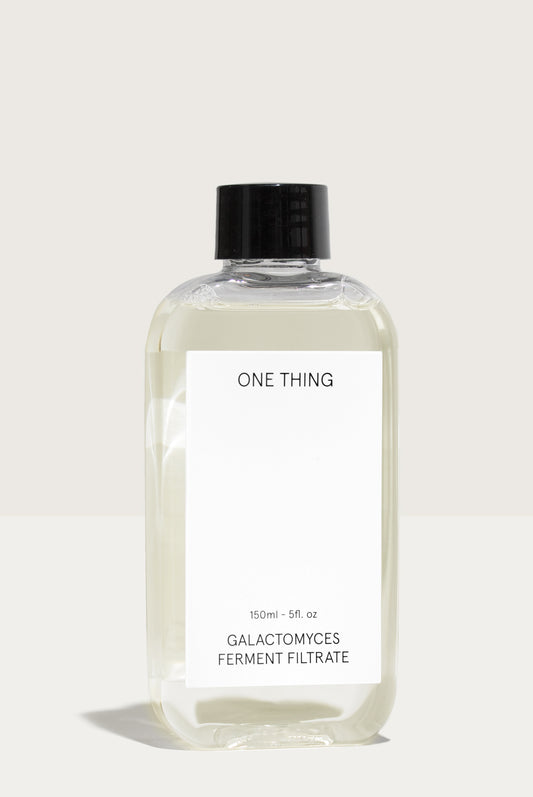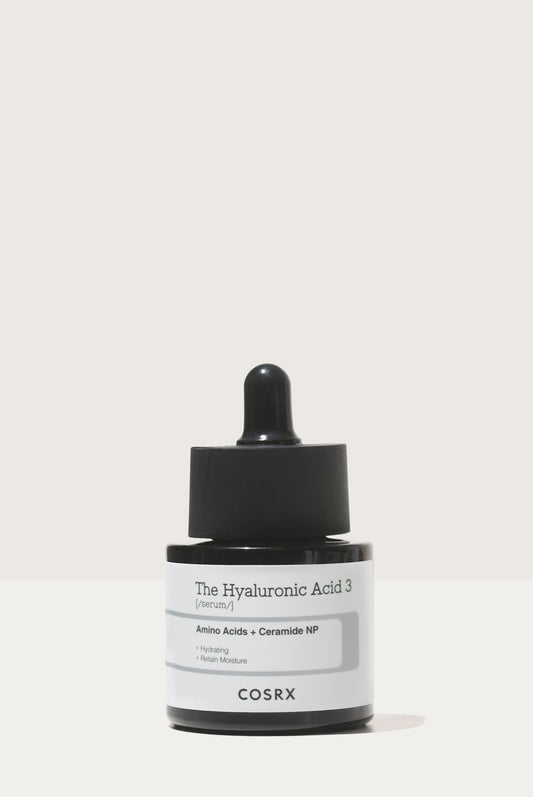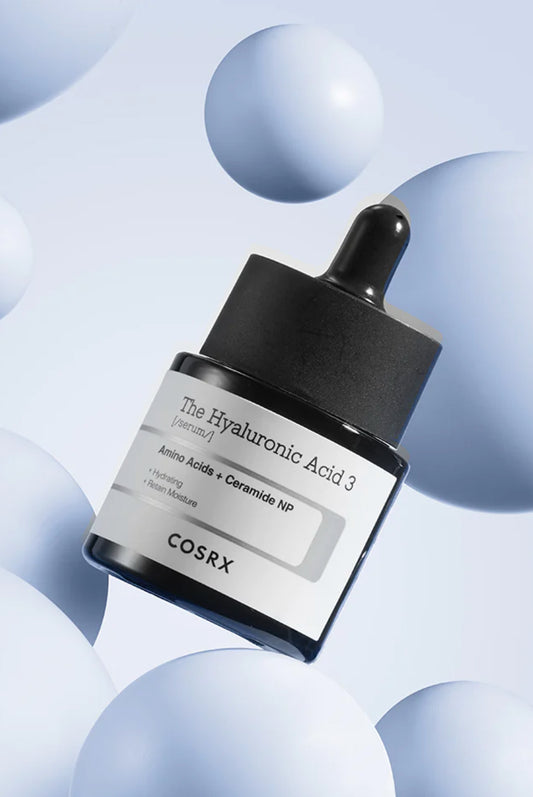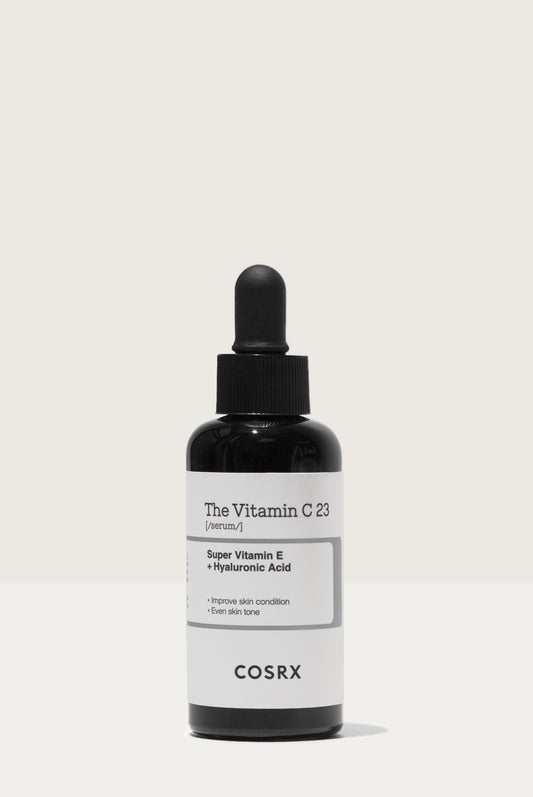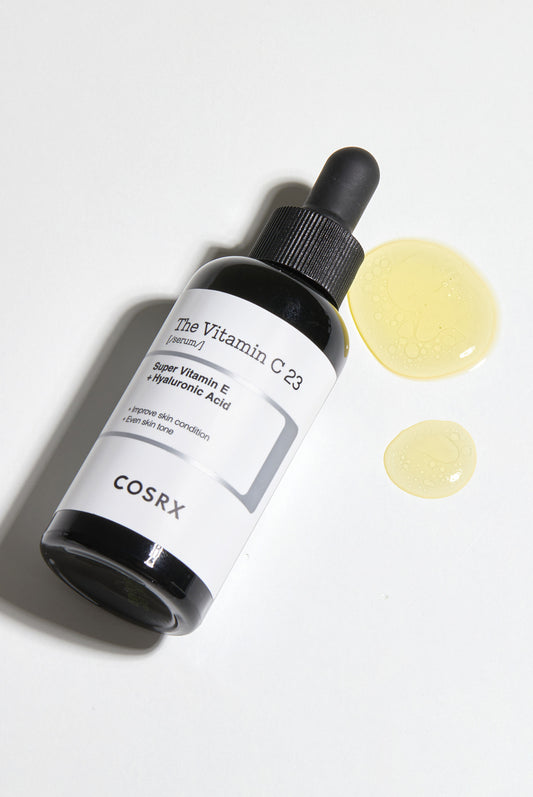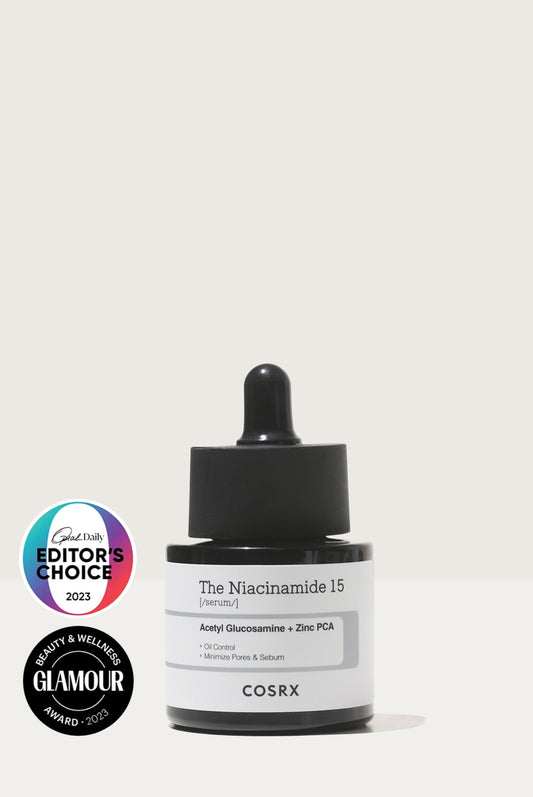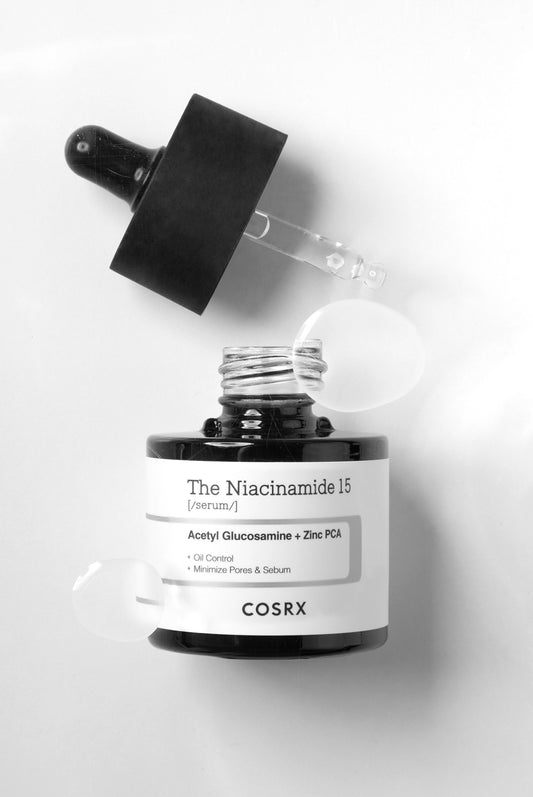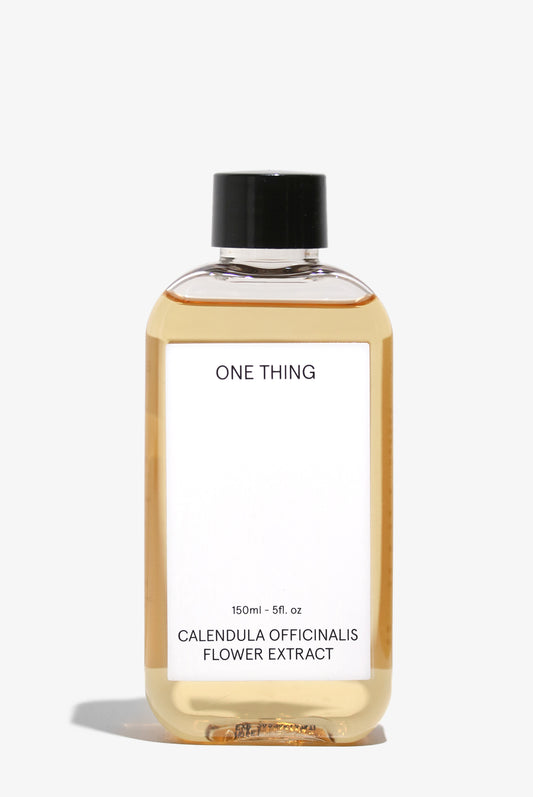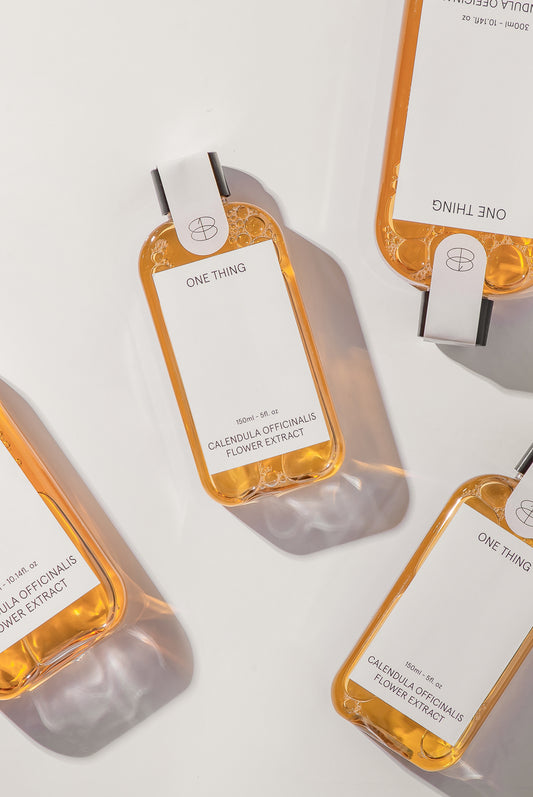Shop by Key Ingredients
AHA / BHA
Centella Asiatica
(aka Tiger grass, Cica, Gotu kola)
Ceramide
Collagen
Hyaluronic Acids
Niacinamide
Propolis / Honey
Peptides
Salicylic Acid
Snail Mucin
Vitamin C
AHAs and BHAs are both types of exfoliants commonly used in skincare to improve skin texture, tone, and overall appearance. They work by helping to remove dead skin cells from the surface of the skin, promoting cell turnover, and revealing smoother, brighter skin underneath. Let's delve into the specifics of AHAs and BHAs, their effective percentages, and why they are important in a skincare routine.
AHAs (Alpha Hydroxy Acids):
AHAs are water-soluble acids that are derived from various sources, such as fruits (e.g., glycolic acid from sugarcane, lactic acid from milk), sugar (mandelic acid), and natural sources. AHAs are known for their ability to exfoliate the skin's surface and improve the appearance of fine lines, uneven skin tone, and dullness. They work by breaking down the bonds that hold dead skin cells together, allowing them to be sloughed off more easily.
BHAs (Beta Hydroxy Acids):
BHAs are oil-soluble acids, with salicylic acid being the most well-known. Salicylic acid is derived from willow bark and is particularly effective at penetrating oil-filled pores. This makes BHAs especially beneficial for individuals with oily or acne-prone skin, as they can help unclog pores and prevent breakouts.
Effective percentages and usage in skincare routine:
The effective percentage of AHAs and BHAs in skincare products can vary based on individual skin sensitivity and the specific acid used. Generally, products containing these acids can range from 5% to 30% or more. It's important to note that higher percentages are not always better and can increase the risk of irritation, especially for those with sensitive skin.
AHAs are typically recommended at lower percentages, around 5% to 10% for at-home use. BHAs, particularly salicylic acid, are commonly used at concentrations of 1% to 2%.
When incorporating AHAs and BHAs into your skincare routine, it's important to start slowly and patch-test the products to gauge your skin's sensitivity. Also, remember to use sunscreen daily, as exfoliating acids can increase skin sensitivity to the sun. If you're unsure about which products to use or how to integrate them into your routine, consulting a dermatologist or skincare professional is always a good idea.
Centella asiatica, also known as Gotu Kola or Tiger grass, is a plant native to Asia that has been used for centuries in traditional medicine for its potential health and skincare benefits. In recent years, centella asiatica has gained significant popularity in the skincare industry, becoming a prominent ingredient in various skincare products. Its emergence as a trend can be attributed to its numerous potential benefits and the growing interest in natural and plant-based skincare solutions.
Centella asiatica can be incorporated into skincare routines in various forms, such as creams, serums, masks, and even cleansers. It's suitable for different skin types, including sensitive and acne-prone skin.
Soothing Effects: If you have sensitive or easily irritated skin, centella asiatica can help calm redness and inflammation, promoting a more balanced complexion.
Acne and Blemish Care: Its anti-inflammatory and wound-healing properties make it beneficial for addressing acne breakouts and reducing the appearance of acne scars.
Overall Skin Health: The antioxidants and hydration properties of this plant can improve the overall health and appearance of your skin.
Natural Ingredient: For those who prefer natural skincare options, centella asiatica offers a botanical solution with a long history of use.
Ceramides are a class of lipid molecules that play a crucial role in maintaining the health and integrity of the skin's barrier function. The skin's barrier function is responsible for protecting the body from external aggressors, such as pollutants, microbes, and moisture loss. This barrier is composed of several components, and ceramides are one of the key components that help keep the skin's protective barrier intact.
In skincare, ceramides have gained significant attention and popularity due to their potential benefits for various skin concerns. Here's a breakdown of their role and why they are considered important in skincare routines:
Barrier Function Support: Ceramides are natural components of the skin's lipid barrier, which helps to keep the skin hydrated by preventing excessive moisture loss and maintaining a healthy moisture balance. A well-maintained barrier also prevents irritants and allergens from penetrating the skin, thus reducing the risk of sensitivity and inflammation.
Moisture Retention: Ceramides enhance the skin's ability to retain water, promoting hydration and preventing dryness. They help to lock in moisture, leaving the skin feeling soft, supple, and plump.
Skin Repair: Ceramides contribute to skin repair and regeneration by promoting the formation of a protective barrier on the surface of the skin. This is particularly beneficial for those with compromised or damaged skin barriers due to conditions like eczema, psoriasis, or extreme weather exposure.
Collagen is a type of protein that acts like the glue holding our body together. It's found in our skin, bones, muscles, tendons, and other connective tissues. Collagen provides strength and structure to these parts, helping them stay strong and flexible.
Plant-Derived Collagen: Plant-derived collagen refers to collagen-like substances that are extracted from plants. While plants themselves don't make collagen, scientists have developed ways to create similar compounds using plant sources. These compounds can mimic some of the benefits of animal-derived collagen.
Improved Skin Elasticity: Collagen helps maintain the skin's elasticity, making it more supple and resilient. This can reduce the appearance of fine lines and wrinkles.
Reduced Wrinkles: As we age, our natural collagen production decreases, leading to the formation of wrinkles. Using collagen in skincare products can help minimize the appearance of wrinkles by enhancing the skin's texture and firmness.
Enhanced Hydration:
Collagen holds water molecules, aiding in skin hydration. Well-hydrated skin looks plump, smooth, and healthy.
Firmer Skin: Collagen contributes to the skin's overall firmness. When incorporated into skincare routines, it can help the skin feel tighter and more toned.
Protection from Environmental Damage: Collagen helps form a barrier against environmental stressors like UV rays and pollution, helping to shield the skin from damage.
Hyaluronic Acid is a natural substance found in our skin that helps maintain its moisture and suppleness. It's like a sponge that holds water, keeping our skin hydrated and plump.
Deep Hydration: HA attracts and retains water, providing intense hydration to the skin's outer and deeper layers.
Plumping Effect: By retaining moisture, HA helps reduce the appearance of fine lines and wrinkles, giving the skin a smoother and plumper look.
Soothing Properties: It can help calm and soothe irritated skin, making it suitable for sensitive skin types.
Improved Texture: HA contributes to smoother and softer skin, enhancing the overall texture and radiance.
Compatibility: HA works well with other skincare ingredients and can be used by people of various skin types, making it a versatile choice for skincare routines.
Niacinamide, also known as vitamin B3 or nicotinamide, is a water-soluble vitamin that has gained popularity as an effective skincare ingredient due to its wide range of benefits for the skin. It is often included in various skincare products, such as serums, moisturizers, and creams, thanks to its versatility and proven results.
Regulation of Sebum Production: Niacinamide helps regulate the production of sebum, the skin's natural oil. This can be particularly beneficial for individuals with oily or acne-prone skin, as it can help reduce excess oiliness and the formation of breakouts.
Minimization of Pores: Niacinamide can help visibly reduce the appearance of enlarged pores by controlling sebum production and improving the elasticity of the skin around the pores.
Even Skin Tone: Niacinamide has been shown to inhibit the transfer of melanin (pigment) within skin cells, leading to a more even skin tone and reduction in the appearance of dark spots and hyperpigmentation.
Anti-Inflammatory Properties: This ingredient possesses anti-inflammatory properties that can help calm redness and irritation, making it suitable for those with sensitive or easily irritated skin.
Boosting Skin Barrier Function:
Niacinamide supports the skin's natural barrier function by enhancing its ability to retain moisture. A strong skin barrier is essential for maintaining hydration and protecting against environmental aggressors.
Effective Percentage of Niacinamide:
The effective percentage of niacinamide in skincare products can vary, but generally, concentrations of around 2% to 5% are considered effective and well-tolerated by most skin types. Higher concentrations can also be used but should be introduced gradually, especially for individuals with sensitive skin, to minimize the risk of irritation.
While niacinamide can be used in both morning and nighttime routines, using it at night is a preference for some individuals due to potential interactions with other products and the skin's overnight repair process. As with any skincare ingredient, it's essential to consider your specific skin type and needs when incorporating niacinamide into your routine.
Propolis: Propolis is a sticky substance made by bees from tree resins, pollen, and beeswax. It's used to seal and protect their hives from bacteria and other intruders.
Honey: Honey is a sweet and thick liquid produced by bees from the nectar of flowers. Bees collect the nectar, digest it, and then store it in honeycombs to use as food.
Natural Antimicrobial: Propolis and honey have natural antibacterial and antifungal properties, which can help cleanse and protect the skin from infections.
Moisturizing: Honey is a humectant, meaning it attracts and retains moisture, helping to keep the skin hydrated and soft.
Skin Soothing: Both propolis and honey have anti-inflammatory properties that can calm irritated or red skin, reducing discomfort.
Antioxidant Boost: These ingredients contain antioxidants that can help protect the skin from damage caused by free radicals, promoting healthier-looking skin.
Wound Healing: Honey and propolis can aid in wound healing due to their antimicrobial and anti-inflammatory effects, supporting the skin's natural recovery process.
Peptides in skincare are short chains of amino acids, which are the building blocks of proteins. They play a vital role in various biological processes, including the structure and function of the skin. In skincare products, peptides are used to target specific skin concerns and enhance its overall health and appearance.
Boosting Collagen: Peptides can signal the skin to produce more collagen, a protein that keeps the skin firm and youthful-looking.
Reducing Wrinkles: Certain peptides can help to relax facial muscles and soften the appearance of fine lines and wrinkles.
Improving Skin Texture: Peptides can contribute to smoother and more even skin texture by supporting cell renewal and repair processes.
Enhancing Hydration: Some peptides aid in maintaining skin's moisture barrier, preventing water loss and keeping the skin hydrated.
Targeted Solutions: Different types of peptides address specific issues like dark circles, pigmentation, or inflammation, offering tailored skincare solutions.
In a nutshell, peptides are like little messengers that communicate with your skin cells, encouraging them to perform certain tasks that lead to a healthier and more radiant complexion.
Salicylic acid is a beta hydroxy acid (BHA) that is commonly used in skincare products, especially for treating acne and other skin issues. It's a type of exfoliant that works by penetrating the pores and dissolving the oil and dead skin cells that can contribute to clogged pores and acne breakouts. Here's how it works and how to incorporate it into your skincare routine:
How Salicylic Acid Works on Acne:
Exfoliation: Salicylic acid is oil-soluble, which means it can penetrate into the pores and effectively exfoliate both the surface of the skin and the inside of the pores. It loosens and breaks down the bonds between dead skin cells, helping to remove them from the skin's surface.
Unclogging Pores: Acne often occurs when pores become clogged with excess oil, dead skin cells, and bacteria. Salicylic acid helps to remove these impurities, which can lead to fewer clogged pores and a reduced likelihood of developing new acne lesions.
Anti-Inflammatory: Salicylic acid also has anti-inflammatory properties. It can help to reduce redness and swelling associated with acne, making existing blemishes appear less inflamed.
Choose the Right Product:
Salicylic acid is available in various skincare products, such as cleansers, toners, serums, and spot treatments. Start with a lower concentration (usually around 0.5% to 2%) if you're new to salicylic acid to avoid potential irritation.
Begin by using the product every other day or a few times a week to allow your skin to adjust. Gradually increase the frequency as your skin tolerates it.
Important Notes:
Irritation: While salicylic acid can be very effective, some individuals with sensitive skin might experience irritation or dryness. If this occurs, reduce the frequency of use or discontinue use temporarily.
Other Acne Treatments: Salicylic acid can be used alongside other acne-fighting ingredients like benzoyl peroxide or retinoids, but it's important to introduce them gradually to avoid over-drying or irritating the skin.
Snail mucin has a slimy and slightly sticky texture, similar to a lightweight gel. It's not heavy or greasy, making it easy to apply and absorb into the skin. There are different types of snail mucin products available in skincare:
Moisture Retention: Snail mucin has humectant properties, which means it attracts and retains moisture on the skin's surface, preventing dehydration and maintaining a healthy moisture barrier.
Soothing Compounds: It contains components like allantoin and glycoproteins that have calming effects on the skin, reducing inflammation and soothing irritation.
Skin Repair: Snail mucin contains growth factors and peptides that can support the skin's natural repair processes, helping to heal minor wounds, scars, and other imperfections.
Collagen Production: It stimulates the skin's collagen production, which is crucial for maintaining skin elasticity and firmness, thus contributing to a more youthful appearance.
Antioxidant Protection: Snail mucin contains antioxidants that help defend the skin against environmental stressors and free radicals, contributing to skin health and resilience.
In essence, snail mucin works as a multi-functional skincare ingredient by providing hydration, soothing, repairing, and anti-aging benefits, ultimately leading to improved skin texture, tone, and overall health.
Vitamin C, also known as ascorbic acid, is a powerful antioxidant that offers various benefits for the skin when incorporated into skincare products. It's renowned for its ability to brighten the complexion, stimulate collagen production, and protect the skin from the harmful effects of free radicals and UV radiation.
Effectiveness and Percentage in Skincare:
The effectiveness of Vitamin C in skincare products is influenced by several factors, including its concentration and formulation. Generally, Vitamin C concentrations in skincare products range from 5% to 20%, with 10% to 20% being common for serums. The optimal concentration varies based on individual skin sensitivity and the desired outcome. Higher concentrations might be more effective in addressing specific issues, but they can also increase the risk of skin irritation, especially for those with sensitive skin.
Pure Vitamin C (L-Ascorbic Acid): This is the most biologically active form of Vitamin C. It's directly absorbed by the skin and provides the most potent antioxidant benefits. However, it's also the most unstable form and can degrade when exposed to light, air, and water, leading to reduced effectiveness over time. To mitigate this, serums containing pure Vitamin C often come in opaque, airtight packaging.
Pure Vitamin C is highly effective but less stable, while Vitamin C derivatives offer stability and varying levels of efficacy. When choosing a Vitamin C product, consider your skin type, sensitivity, and the specific benefits you're looking for. Starting with lower concentrations and gradually increasing can help prevent skin irritation. Additionally, combining Vitamin C with other antioxidants and proper sun protection can maximize its benefits and maintain skin health. Always patch-test new products and consult with a dermatologist if you're uncertain about which Vitamin C product is best for your skin.


Actual results after 4 weeks of using Cosrx The Vitamin C 23 Serum.
INGREDIENT SPOTLIGHT
VITAMIN C
Think of Vitamin C as your skin's superhero! It's an antioxidant that helps fight off pesky free radicals, those troublemakers that damage your skin and cause aging. Vitamin C also brightens up your complexion, fades dark spots, and boosts collagen for plump, youthful skin. It's like giving your skin a fresh and healthy glow!
Starting low and slow is the secret to success! When using Vitamin C in skincare, it's best to start with a lower percentage and then gradually increase it. This helps your skin adjust and avoid potential irritation. Your skin needs time to get used to the Vitamin C superhero power, so treat it gently and let it work its magic over time.
Best Effective Percent :
For the most effective results without causing irritation, Vitamin C serums with a concentration of around 10% to 20% are generally recommended. This range strikes a good balance between providing visible benefits like brightening and collagen boost, while also being gentle on your skin.
Watch Out for Irritation :
Remember, more isn't always better! Using a Vitamin C serum with a concentration above 20% might lead to skin irritation and redness. It's like giving your skin too much of a good thing, and that superhero power can turn into a bit of a tantrum. So, stick to the 10% to 20% range for superhero-level results without the drama!
Vitamin C doesn't get along with ingredients like retinol and benzoyl peroxide, so use them separately to avoid irritation. On the bright side, Vitamin C and sunscreen are like best friends against UV rays! Vitamin C makes your sunscreen even better by tackling free radicals from the sun. Apply Vitamin C in the morning, let it sink in, then put on sunscreen for awesome skin protection. Your skin will love this superhero team-up!
Single Ingredient Skincare
In essence, you'll find skincare products that keep things simple yet effective – Each product features a single hero ingredient, optimized to deliver remarkable results. These concentrated solutions are ideal for individuals in search of targeted remedies, boasting high ingredient percentages tailored to meet personal needs.

